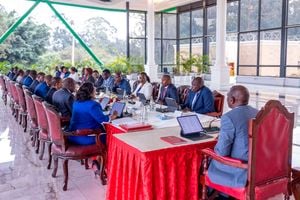MPs fault move to cross-subsidise fuel

A fuel attendant holding a fuel pump at the filling station along Kimathi Street.
Parliament has faulted the move to cross-subsidise fuel on grounds that it is illegal amid concerns of court cases by disgruntled consumers.
Energy and Petroleum Regulatory Authority (Epra) has in the current prices used diesel consumers to cross-subsidise super petrol and kerosene users, helping lower the prices of the two by Sh1.20 and Sh1.30 respectively.
The energy regulator and ministry of Energy have in the past been sued over the cross-subsidisation of fuel, on grounds that the move is unfair and denies consumers higher price cuts.
Cross-subsidy denies users of one grade of fuel higher price cuts whenever global prices fall while cushioning others whenever the prices of their grade of fuel go up internationally. It however helps the Exchequer to avoid spending more money to keep pump prices low.
“The committee noted that the cross-subsidisation policy currently in place which entails charging higher prices to a group of consumers to subsidise lower prices for another group is not clearly anchored in the Energy Act, 2019 and relevant regulations,” the Budget committee says.
The courts have in past dismissed similar concerns from consumers that cross-subsidisation of fuel is not anchored in law.
A litre of super petrol is currently retailing at Sh192.84 and Sh168.76 for kerosene in Nairobi, down from Sh193.84 and Sh170.06 respectively while that of diesel dropped to Sh179.18 from Sh180.38.
But the move denied diesel consumers a higher drop given that its prices in the global markets dropped in April, unlike those for super petrol and kerosene.
Last year, a case challenging Epra’s move to apply cross-subsidy was filed at the High Court in Mombasa with the petitioner arguing that Epra abused pricing regulations by overcharging super petrol consumers to cushion users of diesel.
But the court dismissed the petition saying that it was not convinced by the petitioner’s argument that the cross-subsidy was not anchored in law.
The law allows the ministry of Energy to draw funds raised through the PDL to stabilise pump prices whenever global costs of refined fuel soar.
This is through the Petroleum Development Fund Act and relevant regulations that were gazetted in 2021 that anchor collection of the levy at a rate of Sh5.40 per litre of super petrol and diesel and Sh0.40 for every litre of kerosene.
But the law and relevant regulations are quiet on cross-subsidy, a legal loophole that has in the past led to legal suits over the cross-subsidisation.
The State initially used petrol consumers to cross-subsidise diesel given that it is the fuel which is most used across the economy.
The economy uses diesel for transportation, power generation and running of agricultural machinery, underlining its significance to the economy.
But the move to use diesel consumers to cross users of super petrol and kerosene denied a vast chunk of the economy from enjoying the benefits of the global drop in costs of the fuel.
Cross-subsidisation of fuel allows the Exchequer to share the burden with consumers of at least one of the three grades of fuel.
But the cross-subsidy also raises questions on how the billions of shillings collected through the PDL are used.
The Ministry of Energy has in the past been on the spot for diverting the money to sectors that are not linked to the petroleum sector, leading to depletion of the kitty.
Price stabilisation and now cross-subsidisation have been key in helping the government to avoid public outrage over escalating costs of fuel.
All eyes are on the energy regulator and ministry to see if they will keep the cross-subsidy or turn to stabilisation in the coming months given that global prices of fuel are anticipated to remain stable.
A sustained drop in global prices of fuel last year coupled with strengthening of th shilling from early this year, allowed the government to steer away from the PDL kitty.
The energy regulator, ministry of Energy and the National Treasury turned to cross-subsidy amid struggles by the Exchequer to pay oil marketers billions of shillings for the stabilised prices and also pressure from the International Monetary Fund (IMF).
The IMF— one of Kenya’s biggest financiers and one with a big say in influencing economic policies of the country— had given Kenya a deadline to fully scrap the price stabilisation.
For example, the Treasury opted to convert a Sh45 billion debt owed to oil marketers to a bond last year, amid struggles to pay the money.
The government has been collecting billions of shillings through the Petroleum Development Levy, raising questions on whether the money collected is not enough to stabilise prices.
Consumers of super petrol and diesel pay Sh5.40 for every litre of the two fuels and a further Sh0.40 per litre of kerosene. The money is meant to help keep pump prices lower whenever there is a hike in the global market.
Kenya ended the stabilisation scheme last year but made a U-turn and a cross-subsidisation before the end of the year as prices of fuel soared in the global markets.




